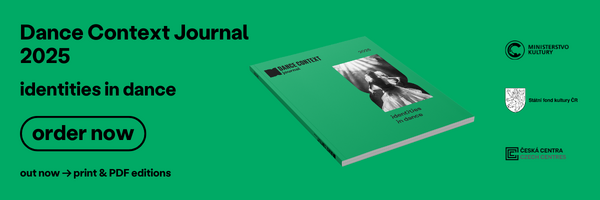Filip Barankiewicz As Director Of The Year?
At the beginning of October, the National Theatre Ballet published the following on its Facebook profile: “Dance Europe magazine has announced the CRITICS' CHOICE poll.” At the beginning it said “The artistic director of the Czech National Ballet Filip Barankiewicz has been awarded Director of the Year by the prestigious British Dance Europe magazine - according to the British dance critic Alison Kent.” In her justification, the author said, “Filip Barankiewicz is credited for his subtle choice of works, ranging from Cranko, Forsythe and McGregor, including ambitious programmes with contemporary choreographers Sharon Eyal and Eyal Dadon in his quest to attract new and younger audience to the Czech National Ballet.”
Where to begin... first of all, it's worth mentioning that this is not an award directly from a prestigious dance magazine, nor from a jury of twelve critics of this magazine, as it might seem at first glance, but it is a nomination of a particular critic, Alison Kent. Secondly, I wonder whether Ms. Kent has also seen reprises of individual pieces, whether she has spoken to the dancers in the company, whether she has read the critical voices of her Czech colleagues and what does she think of them. And also, what she thinks of the premieres that she does not list, how long and in what depth she has actually followed the management decisions of Filip Barankiewicz in the leadership of our first company, for example what she thinks about the case of the dancers' discontent and the subsequent departure of Ondřej Vinklát or the omission of Nikola Márová up to the third cast in the premiere of Swan Lake, etc. Thirdly, it would be worth considering what weight a nomination from one person carries when the majority of domestic authors have long been critical of the current ballet director's performance (apart from myself, for example Roman Vašek, Lucie Dercsényiová, Petra Dotlačilová or Helena Kazárová). Here I would also like to point out that the fact that Alison Kent has her background in Munich and Filip Barankiewicz worked as a dancer in Stuttgart is also suspicious. It is therefore also worth asking to what extent personal connections are influential and to what extent this is really objective recognition as opposed to subjective favouritism.
And then to the justification itself: the names of Forsythe and McGregor always sound good on any repertoire, but you have to see the individual points in their context. For both artists belong to the very dubious-looking dramaturgy of the Forsythe / Clug / McGregor triple bill - three stylistically similar pieces merging into an elusive and indistinguishable whole. Not to mention that the selection of Forsythe's 1991 work The Second Detail, when we have already seen his other, better known and, from my point of view, better quality pieces in Prague, is at least as strange. I wouldn't exactly describe Cranko's Swan Lake from 1963 and Romeo and Juliet from 1958 as refined either, but more of a museum selection. Productions do age, and it's more than evident in this particular pairing - Helena Kazárová, for example, has pointed this out, and the title of her review of Stuttgart's Swan Lake with a Tinge of Naphthalene seems more than telling.
But I could still stomach Cranko, Forsythe and McGregor, except then comes the mention of Eyal and Dadon from the bpm composed evening - note that the name of the third choreographer of the evening is not on the list. This is where I almost want to say that Barankiewicz got the nomination for leader of the year because of the ignorance of important additional information while taking individuals out of context to make them look good. I myself remember my critical response to the evening (link here), even ranking among the most read pieces in our magazine. The huge oversight in the form of Yemi A.D.'s Bohemian Gravity was simply unmissable... it is noticeable that you just have to call things by their real names and suddenly that “appreciation” takes on a whole different meaning and shade.
Translation: Kristina Soukupová.



